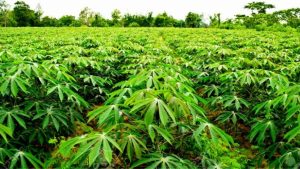By Onome Amuge
Nigeria is ranked among the top ten most arable countries in the world, possessing 34,000,000 hectares and 84,014,000 acres of land capable of being used to grow seasonal crops, according to data by the United Nations Food and Agriculture Organisation (FAO).
The data further showed that Nigeria is without doubt an agrarian country as agriculture accounts for over 23 per cent of the country’s gross domestic product (GDP), with 50 per cent of the population depending on agriculture and its value chain for their livelihood.
Based on the growing substantiation that the adoption of innovative seed varieties is needed to boost agricultural productivity and improve livelihoods of smallholder farmers in the country, the Nigerian government and private sector stakeholders in the agriculture sector have established four identified seed systems in the country. These include; Farmer-saved system, public private system composed of the National Agriculture Research Institutes (NARIs) with private seed company involvement in certified seed production,public led systems, and private-led systems dominated by local seed companies.

Reports show that while smallholder farmers in Nigeria are aware of improved varieties, the rate of adoption is low across most agro-ecological zones, as the majority of smallholder farmers recycle seeds of traditional varieties. Also, adoption of improved varieties is seen to be higher for some crops than others, with smallholder farmers tending to adopt improved varieties of grains more than improved varieties of root and tuber crops, because root and tuber planting material is easily recyclable.Due to this factor, there has been little demand for, or development of, root and tuber varieties.
Current low extension agent-to-farmer ratios, combined with limited involvement of seed companies and other seed entrepreneurs in extension support have also been seen to constrain farmers’ access to knowledge and information on quality seed and advanced cultivation practices that suit their agro-ecology and farming systems.
The Nigerian Seed Portal Initiative, a digital platform that facilitates access to information on improved seed varieties and good agricultural practices in Nigeria, identified lack of easy access to vital information on improved seed varieties as a critical setback to the adoption of a number of high-yielding, climate-resilient, disease-resistant, drought-tolerant, nutrient-rich and adaptable seed varieties of various crops released and registered in Nigeria.Other challenges identified in this aspect include:
-Weak mechanisms to effectively incentivize public crop breeding programs to support the seed sector with improved varieties and early generation seed for use by seed producers.
– Institutional and market constraints tend to limit farmers’ access to quality seed and improved traits, thus limiting opportunities to improve yield, output and revenue that are hallmark of a vibrant agriculture sector.
– Inadequate investment in seed quality assurance services to prevent the entry of lower-quality seed producers and encourage more legitimate entrants to the market.
-Industry structure and market power issues that may be favouring large or incumbent companies and projects over smaller, newer entrants.
With poor industry structure standing in the way of a reasonably competitive seed market, analysts say that it is a no-brainer that seed companies are unlikely to make long-term investments in delivering improved genetics and quality seed to farmers in a timely manner.
According to the Collaborative Seed Programme (CSP), increasing crop productivity and closing the yield gap for all crops in Nigeria requires a combination of quality seed of improved varieties and advanced cultivation practices. The programme, comprising Nigerian and Dutch seed sector stakeholders,also noted that If both interventions are not utilised, farmers may not be able to earn back their investment in quality seed.
It also noted that improved varieties embody specific traits like yield, disease and pest resistance, and resilience to climate change factors such as drought, adding that timely and affordable access to improved varieties and quality seed is essential for productive and remunerative farming.
Based on this, Nigerian farmers have been advised to adopt and utilise innovations in plant science to increase crop yields, improve sustainability and combat food insecurity. According to the Nigerian Seed Portal Initiative, promoting the adoption of improved seed varieties is crucial towards boosting agricultural productivity and livelihoods of smallholder farmers in Nigeria.
Public and private extension, agricultural and rural advisory services have also been advised to play a more prominent role in raising awareness and enhancing the capacity of farmers on the use of quality seed, improved varieties and advanced cultivation practices.
The initiative also noted that there is still much to be done on the implementation front, as the government and agriculture agencies need to create clear procedures and guidelines for seed enterprises, developing producer and regulatory capacity, improving EGS access,and strengthening farmer engagement in the sector itself. This, it explained, needs to be accompanied by improvements in agricultural extension and advisory services which currently seem to prioritize quantitative targets for seed distribution over the development of farmers’ technical capabilities.
It further noted that all of these efforts will ultimately hinge on seed sector actor’s willingness and ability to address the political economy aspects of the seed sector.
“As farmers learn new techniques and use higher quality seed, they will cultivate more crops per acre and will be much willing to adopt and pass on new methods to others,” the initiative said.
Dwelling on this, the Seed Innovation & Protection Alliance (SIPA), noted that innovations from the seed industry are helping to address many of the economic, environmental and health issues globally. Seed improvements, it added, enables farmers to produce more food.
SIPA also expressed confidence that the advancement of seed innovations guarantees better food quality that is more sustainable and better for the environment.








